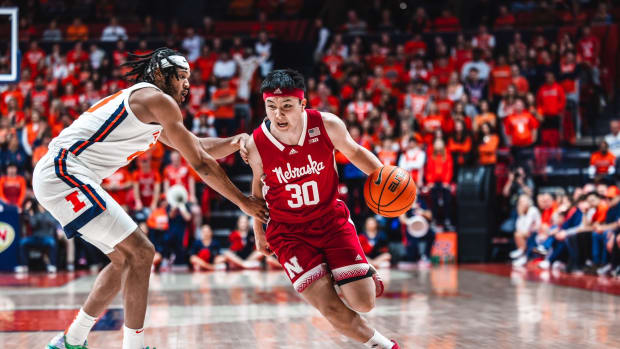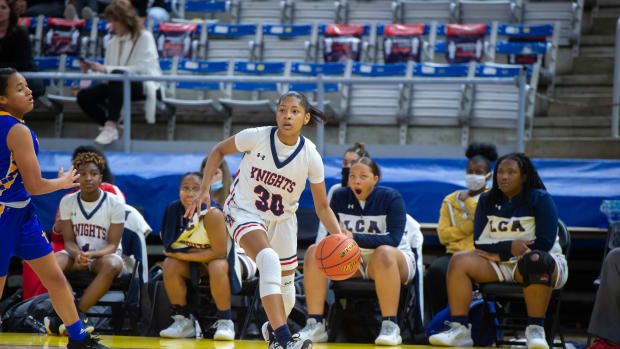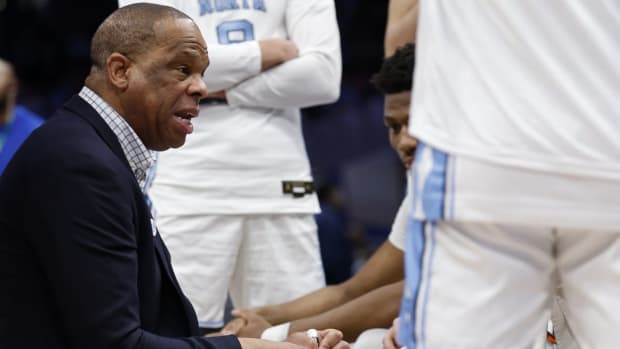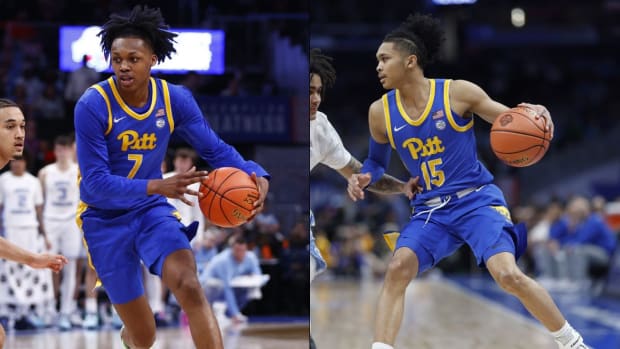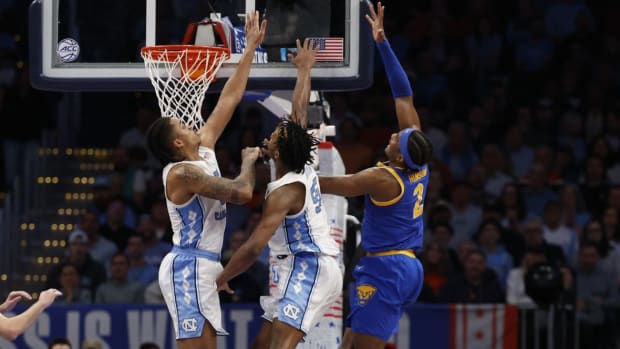Washington's Matisse Thybulle Is Making Defense Sexy Again
SEATTLE – Greg Thybulle never sits, never stops—screaming, shouting, swaying, fist pumping, yelling at referees, pirouetting, dabbing, hugging friends and strangers and planting kisses on so many cheeks. He does not play for the Washington Huskies, but those who do play, they can hear him. At nearby restaurants, they can hear him. At the Space Needle, several miles away, they can hear him.
It’s late February. If Washington tops Colorado, the Huskies will clinch at least a share of the Pac-12 title with four games left in the regular season. Greg stands/sways/dispenses hugs behind the Huskies bench, where his son, Matisse, warms up on the floor at Alaska Airlines Arena, wearing a black T-shirt that says EQUALITY, in front of the deejay and the Dawg Pack.
For the next two hours, the senior guard swarms the Buffaloes, blocking shots, deflecting passes and snagging his 300th career steal to move closer to the conference record of 321, set by Gary Payton, one of the top defenders in Pac-12 (and NBA) history. Thybulle is the best player on the best team in the worst Power 5 conference and, more to the point, he’s arguably the most disruptive force in all of college basketball. Someone whose father says is “making defense sexy again.”
About that: Thybulle arrived at his shutdown mastery through necessity, refining a rare basketball skillset because he had to, then wanted to, then needed to for the Huskies’ transformation from the second-worst team in the Pac-12 only two years ago to the conference’s top NCAA hopeful this season. Growing up in the suburbs east of Seattle, he struggled to consistently make lay-ups until “like eighth grade,” doomed because his coordination had not yet caught up to his speed.
Back then, his father became a basketball referee so his son would take the advice he wanted to impart more seriously. Greg quickly realized that athletic players could more easily become elite defenders than sharpshooters, creating offensive opportunities via steals and blocks. His son embraced that mentality, earning a nickname—The Disruptor—from Huskies coach Mike Hopkins and shining a spotlight on the part of basketball that’s most often overlooked.
Now, as the Huskies (23–6, 14–0 at home, 14–2 in conference hunt for their first NCAA tournament appearance since 2011, Thybulle has become their catalyst, albeit with less national attention than his accomplishments warrant. He leads all current NCAA players in career steals (305), ranks among the favorites to win national defensive player of the year and has become only the third player in the last 20 years to average two steals and two blocks. (The others: Shane Battier of Duke and Nerlens Noel of Kentucky.) Should Thybulle maintain his averages of 3.4 steals and 2.2 blocks, he would become the first player to average 3/2 in those decades, according to Washington sport’s information department.
Counterintuitive best describes both the Huskies' defensive wizard and the backbone of their tournament team. These Huskies don’t just major on defense; their core is formed by four seniors (Thybulle, David Crisp, Noah Dickerson and Dominic Green) intent on dispelling the notion that only teams with one-and-done wunderkinds win come March. The UW seniors played with Markelle Fultz, the No. 1 overall pick, two years ago and won nine games. They lost another first-rounder, Michael Porter Jr., before last season, after firing Coach Lorenzo Romar. With Hopkins, his zone D and the junior class, the Huskies netted 21 victories, coming thisclose to a tourney bid.
“It’s kind of funny that Matisse grew into that kind of player, because his personality has always been one of kindness,” his father says. “He’s always been sensitive to people and very kind. Exactly like his mother.”
Father and son sit side-by-side in a back booth at JOEY Kitchen, a restaurant in U-Village located a short drive from the arena. An endless stream of well wishers stop by the table, everyone from waitresses to managers to strangers who recognize the 6-foot-5 guard snacking on salmon and rice.
Early into an interview, Thybulle rolls his eyes in embarrassment at Greg’s stories. About how his father insisted his wife, Elizabeth, “give” him a son, like she could summon a gender on-demand. Or how he married her at a courthouse, when she was expecting, and suggested she walk in without shoes, barefoot and pregnant. “I don’t think he wants to hear all these details, dad,” Thybulle says.
Greg describes his son’s birth as the “best and scariest moment of my life.” Two years later, in 1998, he moved the family to Australia, and the next year, Elizabeth gave birth to a baby girl, Chloe. Greg started a technical support center in Sydney from scratch; Elizabeth became a naturopathic doctor. Her son spent the years they lived abroad immersed not in shooting strokes but with swimming ones. He says lifeguards “were a really big deal” in Australia, so he went to their camps, learning to swim, surfboard and save lives, defending people even then. “Yeah,” he jokes, “saving them from sharks.”
Thybulle didn’t play much basketball until returning to the United States in 2005, moving to the Seattle suburb of Issaquah. He continued to swim but started to play hoops in youth leagues before his father suggested he choose between the sports in third grade. He figured he could do anything he wanted, bricked lay-ups notwithstanding. “Just like his mother,” Greg says.
Matisse describes his mom as “my best friend.” They would record television shows like NCIS, Person of Interest and Lost, then watch them on the couch together every day after practice.
For his first two high school seasons, Thybulle played at Skyline, ascending from the freshman team to junior varsity to the top squad his first year. In only his second varsity game, Skyline played against Bothell and future NBA slam dunk champion Zach LaVine. Coaches matched Matisse on LaVine and before tip-off the newcomer noticed Romar and Rick Pitino in the stands. Thybulle shut LaVine down, stole the ball from him, blocked some of his shots. It’s the first time Thybulle thought he might be skilled at basketball. Seriously. The first.
As he left the gym last night, Romar stopped him, offering encouragement. But not before Thybulle’s grandmother blurted out, “Did you see my grandson?” as he slapped palm to forehead.
By then, Thybulle had made defense his calling card, even ranking Mickael Pietrus—a “3-and-D” guy before the term existed—among his favorite players. He wasn’t sure if he would play in college, but if he did, it would be because he willingly did things other players balked at doing. “Which is dumb,” he says, “because it’s literally half the game.”
A fan, maybe a college student stops by the table. “You’re on the basketball team, right?” he says. “Keep killing it.” Thybulle never thought of himself that way, as someone who “killed it.” Not back then, when he transferred to another school, Eastside Catholic, and developed into a lower-tier prospect who banked scholarship offers from Southern Utah and not even Cal, but Cal-Irvine. Eventually, Romar offered. Thybulle accepted on the spot.
The waitress checks back in. “What is going on here?” Thybulle asks, unaccustomed to such star treatment.
As his high school career unfolded, his parents settled into distinct roles. Greg was the loud parent; Elizabeth the reserved one. Sometimes she sat in a different section, arriving late after running to the game from home, part of her training for triathlons.
In Thybulle’s senior season, his mom uttered the three words that changed his life: acute myeloid leukemia. Her diagnosis confused Matisse, who saw her as the healthiest person in his life. She never ate red meat, never took the kids to traditional doctors and would alleviate their sicknesses through methods like having them sleep with wet socks on or take baths in baking soda. She lived and looked like an angel, Greg says, but swore like a sailor.
The cancer went into remission, then came back. Elizabeth died the day before her son’s final home game. Senior Night. Teammates carried Matisse onto the floor but he did play one of his best games, even though he remembers only grief.
Last fall, veteran NBA guard Jamal Crawford spoke to the Huskies, and the theme of his speech centered on how he survived 18 NBA seasons: by subjugating his ego. Thybulle identified with that premise; it explained his entire career, the evolution from playing right away as a freshman defensive specialist to leading the conference in steals as a sophomore to winning Pac-12 defensive player of the year last season.
Hopkins arrived in 2017, bringing with him a version of the 2-3 zone he absorbed as a player and then longtime assistant coach at Syracuse. At first, Thybulle thought that approach seemed soft, passive. He soon realized that wasn’t the case. The zone was so difficult to play against because it emphasized aggression and changed constantly, morphing depending on the opposition, with a basic framework but no one typical form. That made it harder to prepare for and harder to adjust to.
Hopkins spent his first weeks at UW simply teaching his players to play defense, not using basketballs, rotating them through all five zone spots so they’d learn how to move within the scheme together. He wanted the Huskies to be tougher, to press more and control the tempo of games. He paced them through boxing workouts and endurance runs and competitions against Washington’s elite crew members on rowing machines. Anything to hone that edge.
At the start of the 2017–18 season, though, the zone looked disjointed. In one closed scrimmage that October against Boise, UW allowed what to Thybulle felt like 100 points. Soon after, Hopkins’s assistants, with input from Thybulle, suggested to their coach that he move his guard with the 7-foot wingspan from the side of the zone to the top. Coach Hop wasn’t sure. That meant shifting 6-foot-4 guard Jaylen Nowell behind Thybulle, ceding some rebounding length. But when Hopkins tried the suggested combination, it worked like magic. That December, the Huskies stunned Kansas, an eventual Final Four team ranked second.
In Thybulle, Hopkins saw the player he wanted to be at Syracuse, where from 1989–’93 he also subjugated ego, pestering opponents, drawing charges, making the extra pass. Teammates called him The Human Bruise. He was Thybulle, without the artistry. Thybulle, his coach insists, is exactly that, an artist, except one with size and that wingspan and a sprinter’s speed. But what really separates Thybulle is his anticipation, the same thing that led him to take photographs in his spare time. He sees what happens before it actually takes place.
“He’s the best guy I’ve had in that zone in the 21 years I coached it,” Hopkins says. He cites other defensive stalwarts from his Syracuse days, players like Lawrence Moten, Michael Carter-Williams, Etan Thomas and Fab Melo. Thybulle, Hopkins says, is more impactful than all of them. “I’ve never seen anything like him,” Hopkins says. “I’m not sure we ever will again.”
The Huskies came to dominate a maligned conference through the identity their coach sought and their senior guard helped shape. For most of conference play they allowed under over 62 points a game, while forcing more than 17 turnovers, both league highs. Washington kept Utah from netting a field goal for 25-consecutive possessions on Feb. 20, holding the Utes to 45 points. The Huskies have spent much of the season's stretch run in the top 20 in KenPom’s adjusted defensive efficiency rankings, which measure points allowed per 100 possessions adjusted for strength of the opponent.
The wider world of college basketball started to take notice. ESPN analyst Jay Bilas posted a Tweet that described Thybulle as a “defensive genius” and “underrated” at the same time. Bilas wrote he thought Thybulle should win national defensive player honors and “it’s not even close.”
His top competition for that award is Zion Williamson, a player who is everything that Thybulle is not—a highly touted freshman and potential first-overall pick who led powerhouse Duke to the No. 1 ranking before spraining his knee on Feb. 20. The injury happened against rival North Carolina and because of the Blue Devils' reliance on Williamson, they were blown out. The Huskies, meanwhile, lost their top forward in Dickerson for a scrimmage this year against Nevada, currently ranked 17th. Because they aren’t overly reliant on any one player, and because they can fall back on their defense, and because Nowell can take over scoring in close games, they won by 20. (This isn’t to suggest that Washington is as good as Duke; only to say the Huskies are capable of winning in different ways.)
They're capable of losing too. The Huskies only reinforced their tenuous national standing with a split against Pac-12 foes in the Bay Area last week. Washington played its worst game this season in a 76–73 loss on Thursday that marked Cal's sixth win, then snuck out of Stanford with a 62–61 victory three days later. The Huskies defense returned to form against the Cardinal, again spearheaded by Thybulle, who made two key defensive stops in the final minute
Elizabeth would have been there, for all of it, although likely sitting a section over from her husband. “It’s funny, because she didn’t really understand basketball,” Thybulle says. “But when I play is when I think about her most.”
Thybulle has not considered the future—not the conference tournament, not the NCAAs, not the potential he may play in the NBA next season, this kid who couldn’t make a lay-up. He’s started to pop into various mock drafts, usually in the second round. Closing in on things like Payton’s steals record still feel surreal to the player who became great but never considered himself that way. “I’m pretty amazed, honestly,” he says.
The Disruptor believes his skillset translates perfectly for how the NBA is changing, with teams building around one or three superstars by finding specialists trained for specific roles. His would be defensive stopper, and perhaps for a playoff team looking for an unselfish guard with a rare and versatile skillset.
Back at the arena, Thybulle dominates Colorado. At the start of the second half, he blocks another shot. His father screams. He steals a pass near the top of the key and slams it home. Greg jumps up and down while turning in circles, as other parents shake their heads. He makes another steal to seal the 64–55 triumph as students wave a Fathead featuring his face in the stands and Greg whoops so loud he threatens his vocal chords. Matisse finishes with 17 points, six steals, five blocks, three rebounds and an assist, taking over the game while taking only 13 total shots, as the Huskies clinch at least a share of their conference title.
“You better pay attention!” Greg screams, and finally, it seems, that college hoops aficionados across the country actually are. This is the best player on the best team in a down conference and what people should begin to notice now is obvious.
Matisse Thybulle is making defense sexy again.


